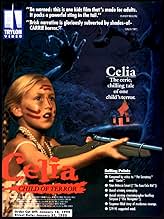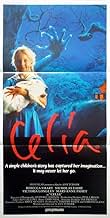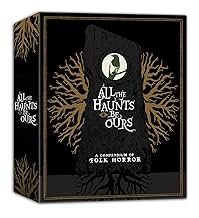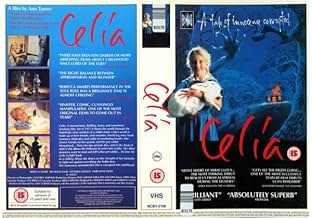IMDb RATING
6.8/10
1.7K
YOUR RATING
An imaginative and somewhat disturbed young girl fantasizes about evil creatures and other oddities to mask her insecurities while growing up in rural Australia.An imaginative and somewhat disturbed young girl fantasizes about evil creatures and other oddities to mask her insecurities while growing up in rural Australia.An imaginative and somewhat disturbed young girl fantasizes about evil creatures and other oddities to mask her insecurities while growing up in rural Australia.
- Awards
- 2 wins & 2 nominations total
- Director
- Writer
- All cast & crew
- Production, box office & more at IMDbPro
Featured reviews
This strange little movie from the land Down Under is really two movies, one of which definitely works, but the other not so much. On one hand, it is a fairly realistic portrait of rural Australia in the 1950's that was dealing with both a plague of rabbits and of Communists. In retrospect, the wild rabbits had a far better chance of over-running conservative Australia than the commies, but the wars on both these "plagues" were somewhat similar in that, as well-intentioned as they may have been, a lot of innocents were caught in the crossfire. "Celia", the young heroine of this film, for instance, has recently lost her Communist grandmother and loses her only friends due to their parents ties to the Australian CP. The fateful blow,however, comes when she loses her beloved pet rabbit "Murgatroyd" to the authorities.
"Celia" is portrayed as having a rich fantasy life that leaves her disturbed and even dangerously disconnected from reality (not unlike the two young girls in the later Peter Jackson kiwi film "Heavenly Creatures"). However, the movie does not focus on this dark fantasy aspect nearly enough, and "Celia" is portrayed as a rather ordinary and, moreover, very sympathetic young girl, which makes the one scene of real-life violence that occurs (actually, it is left a little ambiguous) not very believable. It also doesn't help, as others have said, that in America they seized on the under-developed and unbelievable aspects by trying to market this as a horror movie. This is not quite as good as Peter Weir's famous Aussie film "Picnic at Hanging Rock", but like that movie it has been mis-categorized as a horror movie, and no doubt will disappoint fans of gory, visceral horror, while scaring away a lot of the foreign/art-film enthusiasts that might enjoy it. I actually like both horror and art films, but this is definitely mostly the latter. It would make a good double bill with "Picnic" or "Heavenly Creatures"--or, even better, the weird 1970's indie American film "The Orphan".
It is definitely very well made and the acting is excellent, especially the young Rebecca Smart (child actors in Commonwealth always seem to be far, far better actors than the cloying, "adorable" moppets Hollywood always insists on casting in their saccharine kiddie crap). Check it out if you get a chance.
"Celia" is portrayed as having a rich fantasy life that leaves her disturbed and even dangerously disconnected from reality (not unlike the two young girls in the later Peter Jackson kiwi film "Heavenly Creatures"). However, the movie does not focus on this dark fantasy aspect nearly enough, and "Celia" is portrayed as a rather ordinary and, moreover, very sympathetic young girl, which makes the one scene of real-life violence that occurs (actually, it is left a little ambiguous) not very believable. It also doesn't help, as others have said, that in America they seized on the under-developed and unbelievable aspects by trying to market this as a horror movie. This is not quite as good as Peter Weir's famous Aussie film "Picnic at Hanging Rock", but like that movie it has been mis-categorized as a horror movie, and no doubt will disappoint fans of gory, visceral horror, while scaring away a lot of the foreign/art-film enthusiasts that might enjoy it. I actually like both horror and art films, but this is definitely mostly the latter. It would make a good double bill with "Picnic" or "Heavenly Creatures"--or, even better, the weird 1970's indie American film "The Orphan".
It is definitely very well made and the acting is excellent, especially the young Rebecca Smart (child actors in Commonwealth always seem to be far, far better actors than the cloying, "adorable" moppets Hollywood always insists on casting in their saccharine kiddie crap). Check it out if you get a chance.
Celia is a 9 year old girl with a lot of imagination. She lives with her family in South Australia in the fifties. She has a strong will, lots of charm and wit. Her family are communists, which makes them kind of outcasts in the society, and Celia has to fight mobbing schoolmates as well as discriminating teachers. She manages to do that very well. All this gives a rather frank and funny description of childhood problems, and Rebecca Smart plays her part extremely well. But Celia is not just a charming kid - when she hates, she really hates. And when she fantasizes about mysterious evil animals, she can't quite distinguish fantasy from reality. Which might seem rather normal, but Celia lives in a house, where a loaded gun is available... This movie is very entertaining, giving a varied picture of growing-up - and one can really feel the emotions and confusions, which is a part of being nine years old. At times the film becomes perhaps a bit too confusing - it can be quite difficult to follow the girls vivid imagination. But I'll guess, you have the same problem in the real world...
As a film lover who immigrated to Australia, I've invested a fair bit of effort in seeking out Aussie films that aren't well known abroad, from the popular like 'The Castle' and 'Storm Boy' to Ozploitation like 'Razorback' and 'Next of Kin' to cult classics like 'Wake in Fright' and 'Bad Boy Bubby'. Yet after many years here, I'd never heard of 'Celia' until I saw it pop up on the Arrow site. What a glorious gem to uncover!
It's almost best to go into this film knowing nothing, because it's an extremely difficult one to classify. While there are horror elements, it's most definitely not a horror film. It's probably best described as a period coming of age drama with fantasy elements. But it's not a kids' film-it's very dark.
It's also very hard to pin a date on this film, as it looks like it could have been shot in the '70s or last year, a testament to the quality of the director and crew. The photography, the art direction, the writing and acting are all top shelf. Serious craft here.
I won't give away the story, other than the top-line: It's about a girl named Celia with an active imagination growing up in fifties Cold War Australia and the politics of the time play into the general anxiety of the film.
All you really need to know is, it's a well-crafted film and completely entrancing. It's playful and joyful and sad and dark. The more films I watch, the more I appreciate films that are unlike any other film out there. This is one of them.
It's almost best to go into this film knowing nothing, because it's an extremely difficult one to classify. While there are horror elements, it's most definitely not a horror film. It's probably best described as a period coming of age drama with fantasy elements. But it's not a kids' film-it's very dark.
It's also very hard to pin a date on this film, as it looks like it could have been shot in the '70s or last year, a testament to the quality of the director and crew. The photography, the art direction, the writing and acting are all top shelf. Serious craft here.
I won't give away the story, other than the top-line: It's about a girl named Celia with an active imagination growing up in fifties Cold War Australia and the politics of the time play into the general anxiety of the film.
All you really need to know is, it's a well-crafted film and completely entrancing. It's playful and joyful and sad and dark. The more films I watch, the more I appreciate films that are unlike any other film out there. This is one of them.
It is with a heavy heart that I note Celia, possibly my favourite film, is now being marketed with a tacky subtitle. This film is comparable to Jane Campion's work and is anything but a straight horror film, with a subtle characterisation and a compassionate yet unsentimental picture of childhood not generally associated with that genre. The narrative viewpoint is well sustained, with the grownup world of barbecues, blacklists, and affairs observed from a child's angle. The horror in question is in Celia's imagination, which, like that of all children, plays out the stresses of her own family and her culture. Various plagues - literal and metaphoric - impinge on her world, from myxomatosis to communism. Fans of blood and gore will be disappointed. The film is an unhurried portrait of 50s Australia, the pressure to conform, childhood, death. Its climax is sharp and bloody but logical; as is the lightness of the ending. As a touchstone, think of the daughter in the Piano, with her outrageous storybook lies, her spontaneity, her hurt rebellion, and her ultimate childishness. Just don't think Carrie. This is gem of a film, and let's face it, Hollywood churns out a lot of disappointing ones. As soon as you see the opening titles with Rebecca Smart's expressive face glancing all around her, while the theme music plays, you'll realise you're in the hands of a very talented director.
Celia is a spirited 9 year old girl with a vivid imagination.
Reeling from the death of her beloved grandmother, she seeks out the company of her new neighbours, The Tanners - a warm and loving family harbouring a secret.
Set in an Australian suburb in the late 1950's, the film tackles the prevailing social issues of the time including the "red scare" and the "rabbit pestilence", drawing a parallel between the two.
The film is essentially a drama, but with an added element of dark fantasy (which, although an interesting idea, is used inconsistently and often feels out of place).
But as a coming of age story, Celia is a triumph - an honest and unvarnished exploration of the trials and tribulations of childhood, featuring an astonishing performance by Rebecca Smart in the titular role.
Reeling from the death of her beloved grandmother, she seeks out the company of her new neighbours, The Tanners - a warm and loving family harbouring a secret.
Set in an Australian suburb in the late 1950's, the film tackles the prevailing social issues of the time including the "red scare" and the "rabbit pestilence", drawing a parallel between the two.
The film is essentially a drama, but with an added element of dark fantasy (which, although an interesting idea, is used inconsistently and often feels out of place).
But as a coming of age story, Celia is a triumph - an honest and unvarnished exploration of the trials and tribulations of childhood, featuring an astonishing performance by Rebecca Smart in the titular role.
Did you know
- TriviaThe fairy tale from which extracts were recited in the film was The Hobyahs by James H. Fassett and Robert D. San Souci.
- GoofsThe burn mark on Celia's rabbit is missing at the fishing docks.
- ConnectionsFeatured in Film Review and Interview with Ann Turner from the 'Sunday' Show (1989)
- How long is Celia?Powered by Alexa
Details
- Release date
- Country of origin
- Official sites
- Language
- Also known as
- Celia: Child of Terror
- Filming locations
- Production company
- See more company credits at IMDbPro
- Runtime
- 1h 42m(102 min)
- Sound mix
- Aspect ratio
- 1.85 : 1
Contribute to this page
Suggest an edit or add missing content




























